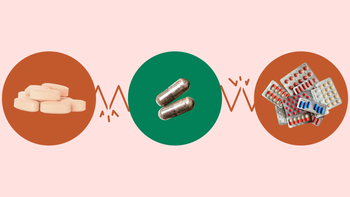
How Can You Reduce Cortisol Naturally? Supplements, Foods, and More
Key takeaways:
A healthy cortisol level is important for both mental and physical health. Increases in cortisol can create both short- and long-term health effects.
Certain supplements can reduce cortisol levels — although some may be more effective than others.
Nutrient-rich foods and drinks can also be a way to support healthy cortisol levels.
Table of contents

Cortisol is a hormone your body makes in response to stress. It’s one of the hormones that helps you respond to dangerous or life-threatening situations. But it has many other roles in your body. Cortisol also affects things like your metabolism, inflammation levels, and your immune system.
In today’s world, many people’s cortisol levels are increased more often than they should be. When cortisol levels are consistently elevated, it can lead to both short- and long-term health problems. But your diet, lifestyle, and supplements can help reduce high cortisol.
What are the signs of high cortisol?
Certain medical conditions — like Cushing’s syndrome — can lead to higher cortisol levels in your body. But high cortisol can also result simply from the stress of everyday life. And this can have real implications for your health.
Save up to 60% on Farxiga
Healthy heart for less. Pay as little as $288 for 30 tablets of Farxiga with GoodRx - no insurance needed.

“When our body releases cortisol, it in turn releases glucose. This is our body’s natural fight-or-flight stress response that allows us to have the energy (glucose) needed to run away or fight back,” said Kaitlyn Seguin, a registered dietitian at Family Nutrition Solutions.
But over the long term, this response can be harmful. “Elevated cortisol and glucose can cause weight gain or weight loss resistance. And along with other diet and lifestyle factors can lead to diabetes,” Seguin said.
Ongoing high levels of stress and cortisol can increase your risk for:
Some of the signs of high cortisol you might notice include:
Weight gain, especially around your stomach
Excess facial hair growth in women
Sleep disturbances
Mood disorders, like depression
Joint and muscle pain
The complications of high cortisol can sound scary. But there are tools to help regulate your cortisol levels and reduce future effects.
Eating to lower cortisol: Find out what one woman adds to her diet to reduce cortisol levels and improve her gut health — and which foods she’s chosen to limit.
More natural strategies: Learn some simple lifestyle changes that can help balance your cortisol levels and may boost your mood at the same time.
Fill your plate: Which foods are most effective at lowering cortisol? Find out what the science says about avocados, dark chocolate, and more.
What supplements can help reduce cortisol?
Supplements that help reduce cortisol are available in many forms — from pills to capsules and more. Some supplements are used to reduce stress, regulate blood sugar, or support other functions related to cortisol.
While you can buy them over the counter (OTC), supplements aren’t risk-free. You should discuss them with a medical professional to ensure they’re safe for you.
Ashwagandha
Ashwagandha has been a popular herb in Asia for thousands of years. It’s considered an adaptogen, an herbal compound reported to help manage stress. It’s also known to support sleep, fertility, and exercise.
Read more like this
Explore these related articles, suggested for readers like you.
One review looked at a group of studies on ashwagandha and stress. Their analysis found that ashwagandha supplementation may decrease serum cortisol levels. Another small study showed a 23% decrease in cortisol levels after 2 months of supplementation.
Even though research is ongoing, current results are promising and show very few, if any, side effects.
Magnesium
Magnesium is an important ingredient in a lot of processes in your body. This means it plays a big role in your health. Even blood pressure and blood sugar can improve with healthy levels of magnesium.
Magnesium deficiency is linked to increased stress. And it works both ways. Stress may lower magnesium levels, and low magnesium may increase stress. The good news is that studies show magnesium supplementation can reduce your cortisol levels.
“It’s my first supplement choice for cortisol management because it also has other benefits,” Seguin said, “like reducing blood pressure and blood sugar, without having any significant side effects.”
One side effect to note is diarrhea. But this is likely only to happen in high doses.
Omega-3 fatty acids
Fish oil is a dietary supplement containing fatty acids, including omega-3. Omega-3 is especially helpful for your immune system, hormones, heart health, and energy.
According to one study, 8 weeks of omega-3 supplementation may reduce morning cortisol levels and symptoms of emotional exhaustion.
While fish oil pills often have some omega-3, they may also contain omega-6. Omega-6 is another fatty acid. Research shows it may not help cortisol or stress like omega-3 can. So, make sure you choose a fish oil that contains omega-3 to best help your cortisol levels.
Vitamin C
Vitamin C is a popular vitamin found in fruits and vegetables. Its potential benefits include:
Potentially reducing the risk of cancer
Managing heart disease
Maintaining healthy vision
Helping your immune system fight off different diseases
Some research shows it can also manage stress and, in turn, cortisol levels.
More research on the link between stress and vitamin C is needed. But recommended doses of vitamin C have few side effects, making it a safer option to try.
L-theanine
L-theanine is an amino acid found in green tea. It has antioxidant, anti-inflammatory, and anti-anxiety effects. A 2016 study showed reduced cortisol levels (measured by saliva) just 3 hours after drinking a beverage with L-theanine.
L-theanine can also relieve stress and maintain normal sleep, according to research. And sleep is important for both your physical and mental well-being, including stress management.
Whether you prefer green tea or another form of L-theanine supplementation, it may be useful to add to your supplement lineup.
Rhodiola rosea
Rhodiola rosea is another type of adaptogen. It’s grown in many places including North America, Europe, and Asia. It’s usually consumed as a capsule or tablet.
Many people take it to boost their immune system and reduce inflammation. But a recent review analyzed rhodiola’s effectiveness against stress. This review found that it lowered cortisol levels, improved energy levels, and improved fertility.
So, rhodiola may provide benefits beyond decreasing cortisol levels alone. But like many adaptogens, a little more research will help experts know for sure how it can help manage stress.
Ginseng
Ginseng is an herb found in both Asia and the U.S. It contains antioxidants called ginsenosides. Ginsenosides may help support your immune system, repair organ damage, and manage chronic inflammation.
Right now, there’s little research between cortisol and ginseng alone. But there are positive associations between ginseng supplementation and stress management. Since stress and cortisol are so closely linked, ginseng may have additional effects on cortisol levels.
What foods can help reduce cortisol?
There’s no single food — or list of foods — that will lower your cortisol level. But a nutritious diet is key to supporting healthy cortisol levels. This includes the right balance of macronutrients and micronutrients.
Macronutrients
Your diet may vary based on your goals, cultural preferences, and other factors. And a healthy diet can look different for different people. But no matter what your diet looks like, it’s important to make sure you’re getting an adequate amount of macronutrients every day.
There are three macronutrients that make up the basis of what we consume: carbohydrate, protein, and fat. The amount of macronutrients you need depends on things like your age, sex, and activity level.
Micronutrients
Beyond macronutrients, micronutrients have specific compounds that may help your cortisol levels. Micronutrients — like some of the ones listed above — don’t just come from supplements. They’re found in food as well.
Magnesium is high in foods like:
Nuts and seeds
Beans
Legumes
Leafy greens, like spinach
Dairy products
Fortified breakfast cereals
Omega-3 fatty acids can be found in foods such as:
Seafood and fish
Plant oils, including canola oil and flaxseed oil
Nuts and seeds
Vitamin C isn’t only found in fruits but also in vegetables, such as:
Bell peppers
Oranges
Brussels sprouts
A note on beverages
Green tea is a great option to reduce cortisol levels, as it contains L-theanine.
You can also consider a functional beverage to help support your health. Functional beverages are drinks with certain ingredients like vitamins, herbs, and minerals. They’re designed to provide specific health benefits. These are often similar to supplements, but in the form of a drink.
But some aren’t as healthy as they seem to be. Check out the drink’s ingredients and macronutrients before consuming it. For example, look for things like added sugar or caffeine. And if it contains a supplement or ingredient that’s unfamiliar to you, it’s best to do some research or ask a healthcare professional before you try it.
Other natural ways to reduce cortisol
Complementary and alternative medicine (CAM) is another useful tool for decreasing cortisol levels. CAM incorporates unique tools such as:
Yoga
Meditation
Tai chi
Massage
Chiropractic
Reiki
Acupuncture
A 2021 analysis of several studies showed a positive relationship between meditation and decreased cortisol levels. Other researchers have noted similar benefits from yoga in reducing cortisol.
Even a simple walk may reduce your cortisol levels. Studies show that walking in nature is especially helpful in regulating cortisol. But any walk you can take is a win for your health — regardless of its location.
Physical activity can support your mental and physical health in many ways. In time, these strategies may all assist in regulating your cortisol levels.
Frequently asked questions
Phosphatidylserine is a type of fat that helps to protect nerve cells. There are just a few studies on whether it can help with stress — and the results aren’t convincing. There’s no evidence that it can lower cortisol levels.
Magnesium is probably the best supplement to start with if you want to lower cortisol. It’s easy to find, inexpensive, and has a number of other health benefits. If you’re taking magnesium for stress, opt for magnesium glycinate. This formulation is better absorbed than one like magnesium oxide, which is better for constipation because it stays in your gut.
No supplement is going to lower cortisol immediately. But one of the best ways to lower your stress level quickly is to use a breathing exercise. This can have an immediate effect on anxiety, stress, heart rate, and blood pressure. If you regularly practice and use these techniques, your cortisol levels will follow accordingly.
The bottom line
Most people feel the impact of daily stress in one way or another. Beyond how it makes you feel in the moment, stress can also impact your health. But supplements, food, and lifestyle habits can help reduce high cortisol levels that come with stress. Small, simple changes in your daily routine can make a big difference. These changes can help you feel better now. And they may also lower your risk of long-term conditions that can develop from stress.
Why trust our experts?


References
Baba, Y., et al. (2021). Effects of L-theanine on cognitive function in middle-aged and older subjects: A randomized placebo-controlled study. Journal of Medicinal Food.
Balić, A., et al. (2020). Omega-3 versus omega-6 polyunsaturated fatty acids in the prevention and treatment of inflammatory skin diseases. International Journal of Molecular Sciences.
Centers for Disease Control and Prevention. (2022). Micronutrient facts.
Cheah, K. L., et al. (2021). Effect of Ashwagandha (Withania somnifera) extract on sleep: A systematic review and meta-analysis. PLoS One.
Chiodini, I., et al. (2007). Subclinical hypercortisolism among outpatients referred for osteoporosis. Annals of Internal Medicine.
Dini, I. (2019). An overview of functional beverages. Functional and Medicinal Beverages.
Hammer, F., et al. (2006). Cortisol metabolism in hypertension. Best Practice and Research Clinical Endocrinology and Metabolism.
Hellhammer, J., et al. (2014). A soy-based phosphatidylserine/ phosphatidic acid complex (PAS) normalizes the stress reactivity of hypothalamus-pituitary-adrenal-axis in chronically stressed male subjects: A randomized, placebo-controlled study. Lipids in Health and Disease.
Hewagalamulage, S. D., et al. (2016). Stress, cortisol, and obesity: A role for cortisol responsiveness in identifying individuals prone to obesity. Domestic Animal Endocrinology.
Jahangard, L., et al. (2019). Omega-3-polyunsatured fatty acids (O3PUFAs), compared to placebo, reduced symptoms of occupational burnout and lowered morning cortisol secretion. Psychoneuroendocrinology.
Joseph, J. J., et al. (2016). Cortisol dysregulation: The bidirectional link between stress, depression, and type 2 diabetes mellitus. Annals of the New York Academy of Sciences.
Kobayashi, H., et al. (2019). Combined effect of walking and forest environment on salivary cortisol concentration. Frontiers in Public Health.
Koncz, A., et al. (2020). Meditation interventions efficiently reduce cortisol levels of at-risk samples: A meta-analysis. Health Psychology Review.
Kotb, M. A., et al. (2020). Cognitive performance in patients with chronic tension-type headache and its relation to neuroendocrine hormones. The Egyptian Journal of Neurology, Psychiatry, and Neurosurgery.
Lee, S., et al. (2017). Effects of ginseng on stress-related depression, anxiety, and the hypothalamic-pituitary-adrenal axis. Journal of Ginseng Research.
Li, Y., et al. (2018). Rhodiola rosea L.: An herb with anti-stress, anti-aging, and immunostimulating properties for cancer chemoprevention. Current Pharmacology Reports.
Lombardo, G., et al. (2019). Baseline cortisol and the efficacy of antiglucocorticoid treatment in mood disorders: A meta-analysis. Psychoneuroendocrinology.
Lopresti, A. L., et al. (2019). An investigation into the stress-relieving and pharmacological actions of an ashwagandha (Withania somnifera) extract. Medicine.
Moritz, B., et al. (2020). The role of vitamin C in stress-related disorders. The Journal of Nutritional Biochemistry.
National Center for Complementary and Integrative Health. (2023). Ashwagandha. National Institutes of Health.
Nys, L. D., et al. (2022). The effects of physical activity on cortisol and sleep: A systematic review and meta-analysis. Psychoneuroendocrinology.
Office of Dietary Supplements. (2021). Vitamin C: Fact sheet for health professionals. National Institutes of Health.
Office of Dietary Supplements. (2022). Omega-3 fatty acids: Fact sheet for consumers. National Institutes of Health.
Olafsdottir, G., et al. (2018). Health benefits of walking in nature: A randomized controlled study under conditions of real-life stress. Environment and Behavior.
Oravcova, H., et al. (2022). Stress hormones cortisol and aldosterone, and selected markers of oxidative stress in response to long-term supplementation with omega-3 fatty acids in adolescent children with depression. Antioxidants.
Ouanes, S., et al. (2019). High cortisol and the risk of dementia and Alzheimer’s disease: A review of the literature. Frontiers in Aging Neuroscience.
Pickering, G., et al. (2020). Magnesium status and stress: The vicious circle concept revisited. Nutrients.
Rosania, A. E., et al. (2009). Stress, depression, cortisol, and periodontal disease. Journal of Periodontology.
Saeed, M., et al. (2020). L-theanine: An astounding sui generis amino acid in poultry nutrition. Poultry Science.
Stojcheva, E. I., et al. (2022). The effectiveness of Rhodiola rosea L. preparations in alleviating various aspects of life-stress symptoms and stress-induced conditions—encouraging clinical evidence. Molecules.
Tennant, F. (2013). The physiologic effects of pain on the endocrine system. Pain and Therapy.
Thau, L., et al. (2023). Physiology, cortisol. StatPearls.
Thirthalli, J., et al. (2013). Cortisol and antidepressant effects of yoga. Indian Journal of Psychiatry.
Tóth-Mészáros, A., et al. (2023). The effect of adaptogenic plants on stress: A systematic review and meta-analysis. Journal of Functional Foods.
U.S. Food and Drug Administration. (2022). FDA 101: Dietary supplements.
Vicennati, V., et al. (2012). Stress-related development of obesity and cortisol in women. Obesity.
White, D. J., et al. (2016). Anti-stress, behavioural and magnetoencephalography effects of an l-theanine-based nutrient drink: A randomised, double-blind, placebo-controlled, crossover trial. Nutrients.





























